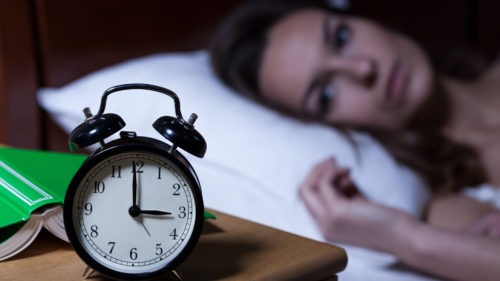Insomnia: Causes, Signs and Treatments

Insomnia is a difficulty in falling asleep or staying asleep. People with insomnia are often dissatisfied with their sleep. Although it can affect people of any age, it is more common in adult females than adult males.
The sleeping disorder can undermine school and work performance, as well as contribute to obesity, anxiety, depression, irritability, concentration problems, memory problems, poor immune system function, and reduced reaction time.
Insomnia has also been associated with a higher risk of developing chronic diseases.
Insomnia is commonly separated into three types:
- Transient insomnia – occurs when symptoms last from a few days to a few weeks.
- Acute insomnia – also called short-term insomnia. Symptoms persist for several weeks.
- Chronic insomnia – this type lasts for months, and sometimes years.
Causes of insomnia
Insomnia can be caused by physical as well as psychological factors. There is often an underlying medical condition that causes chronic insomnia, while transient insomnia may be due to a recent event or occurrence. Insomnia is commonly caused by:
- Disruptions in circadian rhythm- jet lag, job shift changes, high altitudes, environmental noise, heat, or cold.
- Psychological issues- people with mood disorders such as bipolar disorder, depression, anxiety disorders, or psychotic disorders are more likely to have insomnia.
- Medical conditions- brain lesions and tumors, stroke, chronic pain, chronic fatigue syndrome, congestive heart failure, angina, acid-reflux disease (GERD), chronic obstructive pulmonary disease, asthma, sleep apnea, Parkinson’s and Alzheimer’s diseases, hyperthyroidism, arthritis.
- Hormones – estrogen, hormone shifts during menstruation.
- Media technology in the bedroom – Children with TVs, computers, video games, DVD players, and mobile phones in their bedrooms slept considerably less than kids without these devices in their bedrooms. In addition, back-lit tablet computers can affect sleep patterns.
- Other factors – sleeping next to a snoring partner, parasites, genetic conditions, overactive mind, pregnancy.
Signs and symptoms of insomnia
Insomnia itself may be a symptom of an underlying medical condition. However, there are several signs and symptoms that are associated with insomnia:
- Difficulty falling asleep at night (onset)
- Waking during the night (maintenance)
- Waking earlier than desired
- Low energy
- Daytime fatigue or sleepiness
- Irritability, depression, or anxiety
- Poor concentration and focus
- An increase in errors or accidents
- Tension headaches
- Difficulty socializing
- Gastrointestinal symptoms
- Worrying about sleeping
Treatments for Insomnia
Non-pharmacological approaches and home remedies for insomnia include:
- Improving “sleep hygiene”- not sleeping too much or too little, exercising daily, not forcing sleep, maintaining a regular sleep schedule, avoiding caffeine at night, avoiding smoking, avoiding going to bed hungry, and ensuring a comfortable sleeping environment
- Using relaxation techniques- such as meditation and muscle relaxation
- Cognitive therapy- one-on-one counseling or group therapy
- Stimulus control therapy- only go to bed when sleepy, avoid watching TV/ reading/ eating/ worrying in bed, set an alarm for the same time every morning (even weekends), avoid long daytime naps
- Sleep restriction- decrease the time spent in bed and partially deprive the body of sleep, this increases tiredness ready for the next night
Some types of insomnia resolve when the underlying cause is treated or wears off. In general, insomnia treatment focuses on determining the cause.
Once identified, this underlying cause can be properly treated or corrected. In addition to treating the underlying cause of insomnia, both medical and non-pharmacological (behavioral) treatments may be used as therapies.
Disclaimer: This content including advice provides generic information only. It is in no way a substitute for qualified medical opinion. Always consult a specialist or your own doctor for more information.
